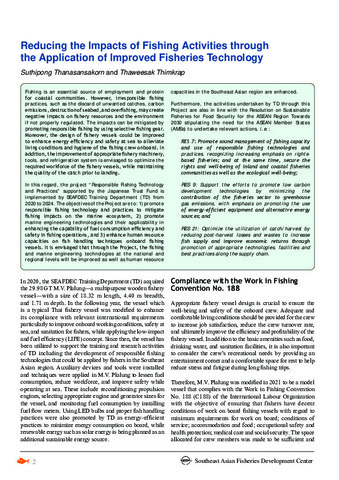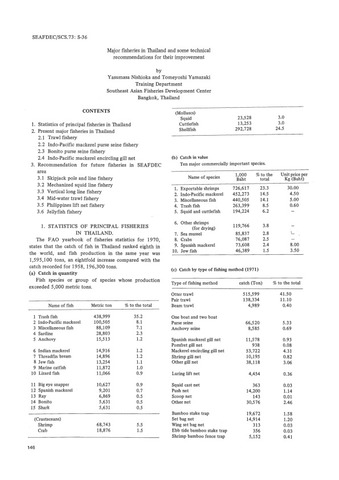Reducing the impacts of fishing activities through the application of improved fisheries technology
Share
abstrak
Fishing is an essential source of employment and protein for coastal communities. However, irresponsible fishing practices, such as the discard of unwanted catches, carbon emissions, destruction of seabed, and overfishing, may create negative impacts on fishery resources and the environment if not properly regulated. The impacts can be mitigated by promoting responsible fishing by using selective fishing gear. Moreover, the design of fishery vessels could be improved to enhance energy efficiency and safety at sea to alleviate living conditions and hygiene of the fishing crew onboard. In addition, the improvement of appropriate fishery machinery, tools, and refrigeration system is envisaged to optimize the required workforce of the fishery vessels, while maintaining the quality of the catch prior to landing.
In this regard, the project “Responsible Fishing Technology and Practices” supported by the Japanese Trust Fund is implemented by SEAFDEC Training Department (TD) from 2020 to 2024. The objectives of the Project are to: 1) promote responsible fishing technology and practices to mitigate fishing impacts on the marine ecosystem, 2) promote marine engineering technologies and their applicability in enhancing the capability of fuel consumption efficiency and safety in fishing operations, and 3) enhance human resource capacities on fish handling techniques onboard fishing vessels. It is envisaged that through the Project, the fishing and marine engineering technologies at the national and regional levels will be improved as well as human resource capacities in the Southeast Asian region are enhanced.
Furthermore, the activities undertaken by TD through this Project are also in line with the Resolution on Sustainable Fisheries for Food Security for the ASEAN Region Towards 2030 stipulating the need for the ASEAN Member States (AMSs) to undertake relevant actions, i.e.:
RES 7: Promote sound management of fishing capacity and use of responsible fishing technologies and practices, recognizing increasing emphasis on rightsbased fisheries; and at the same time, secure the rights and well-being of inland and coastal fisheries communities as well as the ecological well-being;
RES 9: Support the efforts to promote low carbon development technologies by minimizing the contribution of the fisheries sector to greenhouse gas emissions, with emphasis on promoting the use of energy-efficient equipment and alternative energy sources; and
RES 21: Optimize the utilization of catch/harvest by reducing post-harvest losses and wastes to increase fish supply and improve economic returns through promotion of appropriate technologies, facilities and best practices along the supply chain.
Suggested Citation
Thanasansakorn, S., & Thimkrap, T. (2023). Reducing the impacts of fishing activities through the application of improved fisheries technology. Fish for the People , 21(1), 2-5. http://hdl.handle.net/20.500.12066/7356
Subjek
Koleksi
Related items
Showing items related by title, author, creator and subject.
-
Status of Fishing Conditions in Cambodia
Sour, Kim; Vuthy, Ros (Training Department, Southeast Asian Fisheries Development Center, 1997)Fisheries in plays a very important role in Cambodia’s national economic development. Total fish catch production in 1996 was 104 310 tones, about which 60% was contributed by inland capture fisheries, 30% by marine capture ... -
Major fisheries in Thailand and some technical recommendations for their improvement
Nishioka, Yasumasa; Yamazaki, Tomeyoshi (Japan International Cooperation Agency, 1977)Presented in this paper is the development of fisheries industry in Thailand. The data on the production of the principal fisheries species and major fishing methods are also presented. Also included are the recommendations ... -
The Status of Fisheries in the Republic of Maldives
Faiz, Mohamed (Training Department, Southeast Asian Fisheries Development Center, 1997)The paper discusses the tuna fisheries in Maldives which dominates its fishing industry. Apart from a very strong domestic market, tuna is also the main export commodity of the country. Moreover, reef fisheries such as, ...





